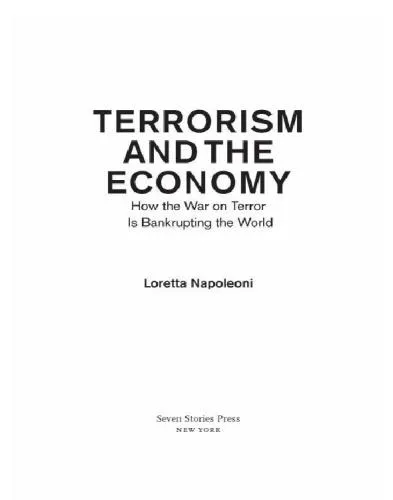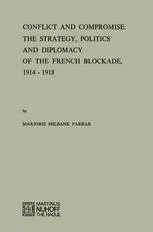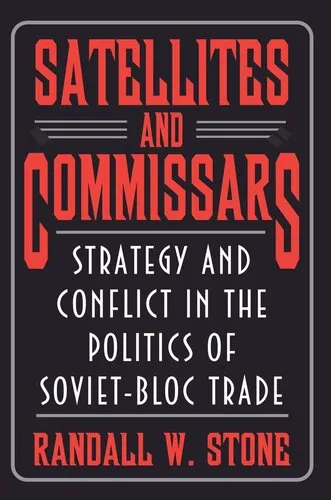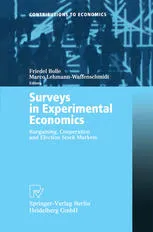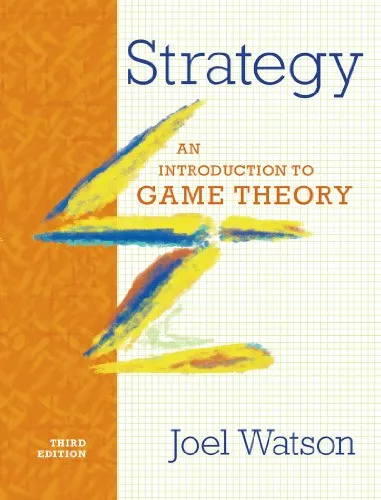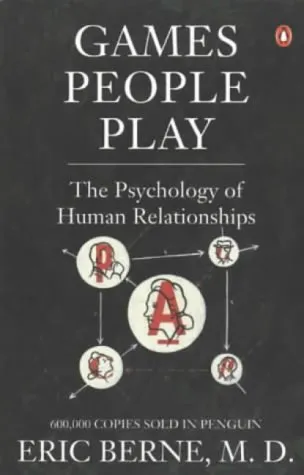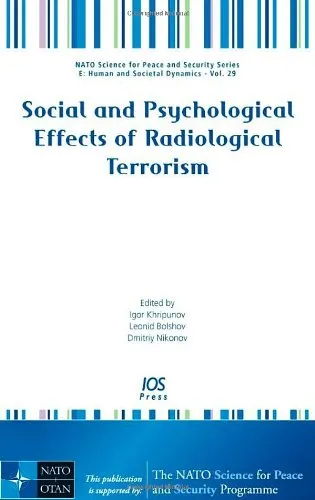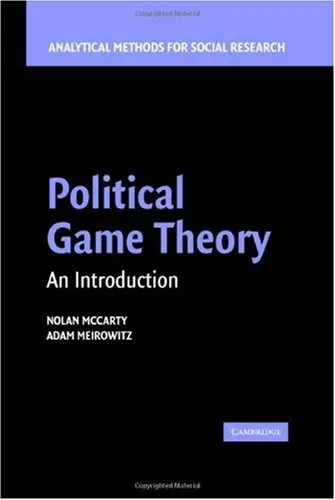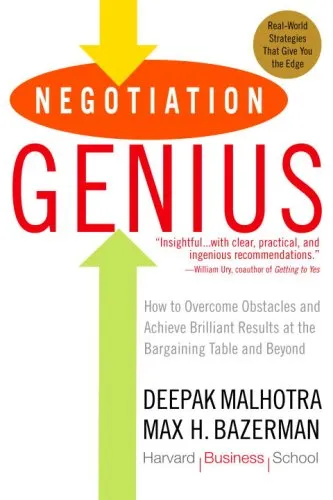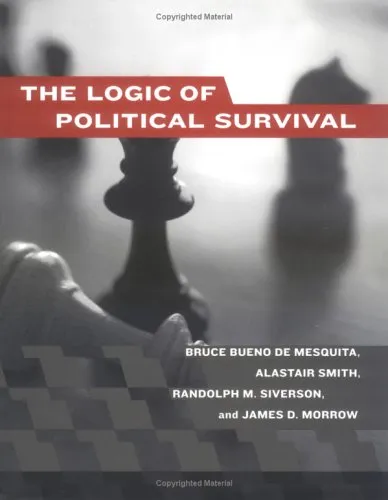Terrorism and the Economy: How the War on Terror is Bankrupting the World
4.0
بر اساس نظر کاربران

شما میتونید سوالاتتون در باره کتاب رو از هوش مصنوعیش بعد از ورود بپرسید
هر دانلود یا پرسش از هوش مصنوعی 2 امتیاز لازم دارد، برای بدست آوردن امتیاز رایگان، به صفحه ی راهنمای امتیازات سر بزنید و یک سری کار ارزشمند انجام بدینکتاب های مرتبط:
معرفی کتاب "Terrorism and the Economy: How the War on Terror is Bankrupting the World"
کتاب "Terrorism and the Economy: How the War on Terror is Bankrupting the World" نوشته لورتا ناپولئونی، تحقیقی دقیق و متعهدانه است که رابطه میان جنگ علیه تروریسم و فروپاشی اقتصادی جهان را مورد بررسی قرار میدهد. این کتاب نگاهی عمیق و مستند به این موضوع دارد که چگونه سیاستهای اقتصادی و مالی مرتبط با War on Terror به بحرانهای عمده اقتصادی منجر شده است و اصول اقتصاد جهانی را به چالش کشیده است.
خلاصه کتاب
در این کتاب، نویسنده توضیح میدهد که چگونه جنگ علیه تروریسم در دو دهه اخیر نه تنها تاثیرات عمیق اجتماعی و سیاسی به جا گذاشته، بلکه به طور جدی ساختارهای اقتصادی جهان را نیز مختل کرده است. لورتا ناپولئونی چرخه پیچیدهای از ارتباطات میان اقتصاد کلان، تأمین مالی تروریسم، و سیاستهای ضدتروریستی را شرح میدهد و به این سوال میپردازد که چرا دولتها به رغم بحران اقتصادی، همچنان به سرمایهگذاریهای کلان در این بخش ادامه میدهند.
او استدلال میکند که از زمان حملات 11 سپتامبر، اقتصاد جنگ علیه تروریسم به اقتصاد جهانی تحمیل شده است و هزینههای هنگفت نظامی و امنیتی به بدهی عمومی کشورهای غربی افزوده است. این کتاب با تحلیل جامع از دادهها و مصاحبه با کارشناسان، به مخاطب نشان میدهد که چگونه بانکها، شرکتهای چندملیتی و حتی دولتها از این چرخه برای منافع خاص خود بهره میبرند.
نکات کلیدی کتاب
- روند تأمین مالی تروریسم و نقش بانکهای جهانی در این فرآیند.
- چگونگی تبدیل War on Terror به یک صنعت پردرآمد.
- تأثیرات مخرب اقتصادی جنگ علیه تروریسم بر کشورهای غربی و جهان در حال توسعه.
- تحلیل دقیق رشد بدهی ملی در نتیجه مخارج نظامی سنگین پس از 11 سپتامبر.
- ارتباط میان سیاستهای اقتصادی و رشد ناکارآمدی در ساختارهای دموکراتیک.
جملات مشهور از کتاب
"جنگ علیه تروریسم، بازارهای مالی و اقتصادی را به همان اندازه تحت تأثیر قرار داده که زندگی انسانها و جوامع را متحول کرده است. ما در دنیایی زندگی میکنیم که اقتصاد ترور همانقدر واقعی است که بازار بورس."
"این یک حقیقت غیرقابلانکار است: هزینههای جنگ تا کنون چیزی بیش از دلاری برای امنیت نبوده است، بلکه دینامیتی بوده که زیر پای اقتصاد جهانی کاشته شده."
چرا این کتاب اهمیت دارد؟
کتاب "Terrorism and the Economy: How the War on Terror is Bankrupting the World" به دلیل بررسی دقیق نتایج اقتصادی و اجتماعی جنگ علیه تروریسم، اثری بینظیر است. اهمیت این کتاب در این است که نه تنها به سیاستمداران و پژوهشگران، بلکه به شهروندان عادی نیز درک بهتری از پیامدهای سیاستهای دولتهایشان میدهد. ناپولئونی خوانش جدیدی از مفهوم جنگ علیه تروریسم ارائه میدهد و نشان میدهد که چگونه اقتصاد جهانی به خاطر این سیاستها در مخاطره افتاده است.
این کتاب به ما یادآور میشود که هزینههای جنگ تنها به میدان نبرد محدود نمیشوند، بلکه تأثیرات آن تا عمق زندگی روزمره مردم در سراسر دنیا گسترش یافته است. ناپولئونی با ارائه شواهد معتبر و تحلیلهای قوی، صدای منتقدانهای را ایجاد میکند که برای درک عواقب واقعی جنگ علیه تروریسم ضروری است.
Introduction to "Terrorism and the Economy: How the War on Terror is Bankrupting the World"
"Terrorism and the Economy: How the War on Terror is Bankrupting the World" is an eye-opening exploration of the complex and damaging connections between modern-day terrorism, global economic policies, and the ongoing consequences of the post-9/11 War on Terror. Written by renowned economist and political analyst Loretta Napoleoni, this book masterfully dismantles the financial myths surrounding the fight against terrorism and exposes how poorly planned responses have imperiled the global economy and depleted national resources. It is an essential read for anyone seeking to understand the intricate interplay between global financial systems, geopolitics, and security policies in the modern era.
The book delves deep into how resources are mobilized and misallocated in the name of combating terrorism, how profiteering is enabled through war-driven markets, and why the broader economic destabilization caused by these policies is something the world can no longer afford to ignore. With clarity and precision, Napoleoni critiques the hidden costs of this ideological war, showing how it often benefits an elite minority while pushing average citizens into economic hardship.
Detailed Summary of the Book
At its core, "Terrorism and the Economy" examines the obscure and often misunderstood relationship between terrorism as a global phenomenon and the economic responses it provokes. Using case studies and historical data, Napoleoni illustrates how the War on Terror has morphed into an economic black hole, consuming trillions of dollars while delivering little in terms of effective solutions to the actual problem of terrorism.
One of the key insights of the book is Napoleoni’s analysis of how terrorist financing operates. She unveils the financial networks that support terrorist organizations, showing how these groups adapt to economic sanctions and countermeasures. At the same time, she critiques the overreliance on counterterrorism spending by Western governments, which often sacrifices social programs and economic development to fund military interventions and security measures.
The book also highlights the economic consequences of prolonged conflicts in regions like the Middle East and South Asia. These wars not only devastate local economies but also destabilize neighboring regions, creating refugee crises and long-term developmental challenges. Furthermore, Napoleoni sheds light on the role of private corporations and financial institutions that profit from war-related spending, growing wealthier while taxpayers bear the burden of systemic failures.
Key Takeaways
- The War on Terror has diverted trillions of dollars away from productive domestic economic uses into military and security spending.
- Terrorist organizations have built resilient financial models relying on informal networks, often evading international regulations.
- Economic destabilization caused by wars and counterterrorism efforts perpetuates cycles of violence and underdevelopment in conflict regions.
- Corporations and elites often benefit disproportionately from conflict-driven economies, at the expense of broader societal well-being.
- A more holistic approach to global security and economic development is essential for breaking the cycle of violence and economic instability.
Famous Quotes from the Book
"The War on Terror sold itself as the ultimate fight for human freedom, but its primary exports have been instability and poverty."
"Understanding terrorism as an economic entity is key to dismantling its grip on global power and resources."
"The greatest irony of the War on Terror is that it has done little to dismantle terrorism but has fundamentally altered the financial stability of the world."
Why This Book Matters
This book is especially significant in today’s interconnected world, where economic and security policies often overlap in ways that many do not fully grasp. By breaking down the financial structures of terrorism and the global economic mechanisms fighting it, Loretta Napoleoni has provided an invaluable tool for policymakers, scholars, economists, and concerned global citizens. It pushes readers to critically evaluate the effectiveness of their governments’ responses to terrorism and understand the long-term consequences of prioritizing short-term reactions over sustainable solutions.
Moreover, the book highlights the fundamental need for transparency, accountability, and justice in the global fight against terror. It asks tough questions about who truly benefits from conflict economies and challenges the status quo, making it a crucial resource for shaping informed public discourse and policy decisions.
دانلود رایگان مستقیم
شما میتونید سوالاتتون در باره کتاب رو از هوش مصنوعیش بعد از ورود بپرسید
دسترسی به کتابها از طریق پلتفرمهای قانونی و کتابخانههای عمومی نه تنها از حقوق نویسندگان و ناشران حمایت میکند، بلکه به پایداری فرهنگ کتابخوانی نیز کمک میرساند. پیش از دانلود، لحظهای به بررسی این گزینهها فکر کنید.
این کتاب رو در پلتفرم های دیگه ببینید
WorldCat به شما کمک میکنه تا کتاب ها رو در کتابخانه های سراسر دنیا پیدا کنید
امتیازها، نظرات تخصصی و صحبت ها درباره کتاب را در Goodreads ببینید
کتابهای کمیاب یا دست دوم را در AbeBooks پیدا کنید و بخرید
